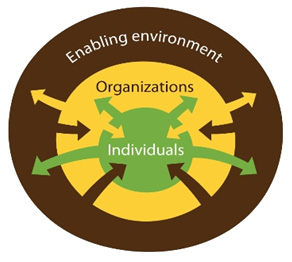A corporate approach to capacity development
Capacity development is a core function highlighted in FAO's strategic framework. It is a key to sustainable results at country level and ensures that FAO’s efforts lead to lasting changes. Member Countries place strong emphasis on FAO enhancing delivery in this area as endorsed by the Corporate Strategy on Capacity Development.
In FAO’s view, capacity development is driven by country actors, consistent with national priorities and the local context, and anchored in national systems and local expertise. Capacity development needs to be undertaken in partnership with national, regional and international players and requires long-term interventions rather than stand-alone short-term events.
FAO’s Capacity Development Framework
A country reaches its development goals only by strengthening its individuals and organizations while creating an enabling policy environment.

Capacities at the three dimensions are interlinked: individuals, organizations and the enabling environment are parts of a whole. Capacity development often involves enhancing the knowledge and skills of individuals, whose work results greatly rely on the performance of the organizations in which they work. The effectiveness of organizations is influenced by the enabling environment. Conversely, the environment is affected by organizations and the relationships between them.
In addition to a three dimensional approach, successful FAO programmes have demonstrated that both technical and functional capacities are crucial for strengthening Member Countries’ capacities in agriculture and rural development.
Technical capacities are necessary for Member Countries to achieve their development goals in the broad areas of food security, nutrition, agriculture and rural development.
Functional capacities enable countries to lead and manage their change initiatives. FAO emphasizes the development of not only the technical capacities but also the functional capacities of its Member Countries' to:
- formulate and implement policies and lead policy reform;
- generate, manage and exchange information and knowledge;
- engage in networks, alliances and partnerships; and
- implement programmes and projects, from planning to monitoring and evaluation.
A comprehensive portfolio of CD activities
FAO's portfolio of capacity development activities is broad and includes: training and training of trainers (TOT), coaching and mentoring, organizational development, support to informal networks, and South South cooperation agreements. FAO increasingly works with national training institutes and universities to support the adaptation of new knowledge into existing curricula. FAO also supports organizations such as sector ministries to coordinate better among themselves and with others (private sector, farmer and producer organizations and civil society organizations (CSO)) in multi-stakeholder processes. At policy level, as a neutral convener FAO supports policy dialogue and policy processes for the formulation and implementation of country-owned policies.

